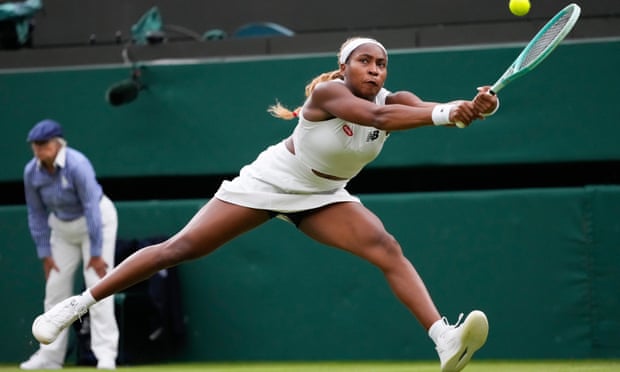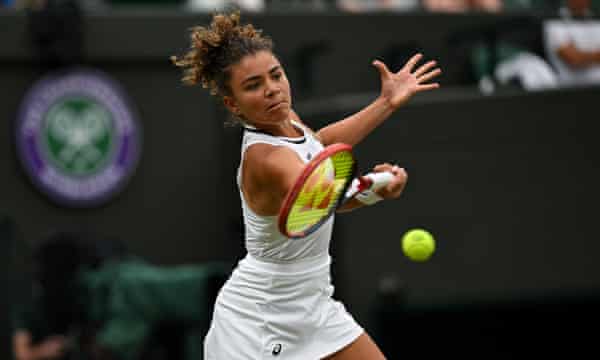CELEBRITIES
Bridge too far as spirited Sonay Kartal gives way to Coco Gauff’s superiority

For about half an hour on No 1 Court, Sonay Kartal conjured up thoughts of a major upset as she went toe to toe with Coco Gauff, one of the favourites for the women’s title. The first British qualifier to reach the third round here since 1997, Kartal was not fazed by the occasion or opponent, and recovered an early break for 4-4 before the second seed pulled away for a 6-4, 6-0 victory.
Ranked 298, the 22-year-old Kartal will now return to the world’s top 200 at a career-high 189, reward for qualifying and then beating seasoned players in Sorana Cirstea and Clara Burel. The No 2 seed proved a bridge too far, but the progress is encouraging.
Gauff, meanwhile, is through to the fourth round without dropping a set as she tries to add Wimbledon to her first slam title, won at the US Open last summer. She will play a fellow American, the No 19 seed Emma Navarro, next.
I thought I played really well,” Gauff said. “She was playing high level, especially in the first set. She wasn’t giving me much to work with and she mixes it up, so you never feel settled. I was just trying to make [fewer] mistakes. Eventually I found it and I was able to do well.”
The first time Jasmine Paolini played on grass, she was not quite sure what to make of it all. Having grown up on clay, the Italian had really only seen grass-court tennis on television, so when she arrived in England in 2016 it was an unusual feeling.
“[It was] the first time I [tried to] qualify for Wimbledon,” she said. “It was a really weird relationship with grass, I think. I remember I won with [Aryna] Sabalenka … in Ilkley. I said, ‘oh, maybe I can play here’. But then the year after that win, I played not so well. My coach was telling me: ‘Look, you can play well,’ but I wasn’t believing it. Now I am enjoying it. I think it’s nice to play on grass. I played a good week last week in Eastbourne. I’m feeling good at the moment.”
So she should be. Having begun the year ranked 29, Paolini won her second WTA Tour title in Dubai in February and then enjoyed a breakthrough run to the final at the French Open, only losing out to Iga Swiatek, the now four-time champion.
On Friday she continued to make the transition from clay to grass look easy as she beat Bianca Andreescu, the former US Open champion, 7-6 (4), 6-1 to reach the fourth round. Until this year she had not won a match at Wimbledon in three previous attempts.
I think I played a really good match,” she said. “It was not easy. She’s a great player, a grand slam champion. So I’m really happy.”
At 5ft 4in Paolini is one of the shortest players on the Tour. What she might lack in height, she more than makes up for through her movement and her racket-head speed, which can turn defence into attack in a flash. Her low centre of gravity is also a bonus on grass, where the ball bounces less, especially in the cooler conditions she has faced throughout the first week.
Next up for Paolini is Madison Keys, a former US Open finalist and a quarter-finalist at Wimbledon twice. The American took care of Marta Kostyuk of Ukraine 6-4, 6-3 and will present Paolini with new problems.
“It’s going to be tough,” the Italian admitted. “I think last year I [won] two games against her in Dubai. But I hope it’s going to be a different match. I practised with her in Eastbourne once. [I’m] looking forward to this match. I hope to play a good match and we will see.”
This time last year, Paula Badosa had to retire on court with a lower back injury that kept her off the Tour until just a couple of months ago. On Friday the Spaniard burst into tears after her 7-6 (6), 4-6, 6-4 win over Daria Kasatkina, the winner in Eastbourne last weekend.
It’s not my first time in a second week, but I think it’s the most special,” said the former world No 2, who reached the last 16 in 2021 and 2022. “I’m really proud of myself. I’ve been struggling a lot with injuries.
“For me, it meant so much. Last year here I had to retire. Then it took me At the start of the year I felt myself so far away … now seeing myself back at it, it means a lot.”
Teams of lawyers from the rich and powerful trying to stop us publishing stories they don’t want you to see.
Lobby groups with opaque funding who are determined to undermine facts about the climate emergency and other established science.
Authoritarian states with no regard for the freedom of the press.
Bad actors spreading disinformation online to undermine democracy.
***
But we have something powerful on our side.
We’ve got you.
The Guardian is funded by readers, like you in Nigeria, and the only person who decides what we publish is our editor.
If you want to join us in our mission to share independent, global journalism to the world, we’d love to have you on side.












